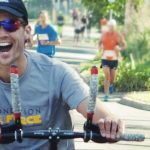
Alex Smith
CEO, Harrison’s Fund, United Kingdom
In this eighth interview of our series “ Portrait of Duchenne ”, La Fondation La Force talks with Alex Smith, CEO of Harrison’s Fund, a British-based, leading charity for research into Duchenne muscular dystrophy (DMD). Alex’s life changed when his son Harrison, now 11, was diagnosed with DMD. He decided to do something to make a difference.
Before diagnosis
Alex worked in brand marketing in an area near London, England. Every night, he came home to a lovely family, his wife and two sons. As a father, he had many dreams for his children’s future. He hoped that they would grow into productive young men, who would wed and start families of their own.
Alex wasn’t a sporty guy. For at least 20 years, he hadn’t worked out or participated in any sports. In fact, he was physically inactive.
He knew nothing about charities and how they worked.
After diagnosis
Then, his son Harrison was diagnosed with DMD.
“When it first happened, it was a really tough moment. The doctor, like (for) many other families, told us our son was going to die and that we should take him home and give him a good life. And, in that moment, our world changed, because it just felt incredibly numb,’’ Alex told us. ”
But Alex realized,
“I’m one of those people who needs to pick himself up and do something about it.”
He started Harrison’s Fund and dedicated his life to the charity.
“We raise money, raise awareness, then give that money to some of the best researchers in the world to try to make a profound difference to all children with Duchenne everywhere.”
Ironman
Alex has learned that every action, every movement counts. In 2016, he signed up for an Ironman competition to raise funds for research, but that wasn’t all. “What I wanted to do was (to) have something for Harrison that he could do with me.”
The two trained hard and raced to the finish line together.
“Finishing it with him was probably the most emotional day of my life,” Alex told us. “I remember coming around… the final finish corner with him, going running down the finishing chute, crowds everywhere, Dimitri with us, and he turned to me just before we went down the chute and said, ‘Daddy, we’re going to be Ironmen together.’”
DMD changes your life in a split second
The progression of DMD is unforgiving: the body’s muscles gradually weaken, leaving children with DMD in a wheelchair by age 12. They have a life expectancy of 20 to 30 years. There is no cure and, in Canada, no treatment for the cause. Two treatments for DMD are approved in the USA and Europe, but they don’t benefit all children with DMD. Promising treatments, in development, are expected within 5 to 10 years.
What’s next for Alex?
Stay rooted in the present. Enjoy every moment with your child. Be part of the solution.
“The most important aspect of trying to remain positive is choosing to be positive,” Alex says. “Nobody else is going to do it for you, are they? You can’t sit back on your hands and expect everybody else to get it done, because they all need help as well.
“That allows the community, the global Duchenne community, when they see positive people, to keep hold of hope and to grasp it. And if they do that, then we’ll get there. And I truly believe we will.”
Acknowledgements
We thank Action Duchenne, who received us with open arms to conduct a series of interviews.

Action Duchenne – Harrison’s Fund
To receive the next interview in our series “Portrait of Duchenne”, please subscribe to our newsletter.
Watch Alex’s full story HERE



